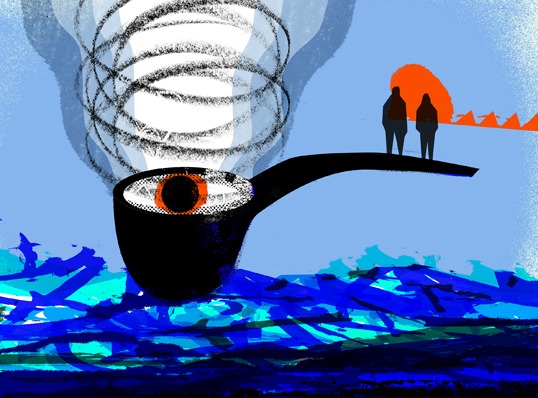When Asymptote’s October issue came out nearly a month ago, I (that is to say, your trusty blog editor Patty Nash, with my co-editor Eva Richter) promised that the favorites we had picked were merely the tip of the iceberg. That there were more where those came from, which is to say that they weren’t favorites at all, per se, because the word “favorite” implies absoluteness. And in an issue as large and diverse as ours, sticking to one or two final picks feels like an unnecessary burden: as blog editors, we do make the rules, after all.
So I’m here again, with a poetry recommendation from deep inside the magazine. This time, I’m suggesting taking a long, hard look at three poems by Mexican writer Tedi López Mills from the collection Against the Current, translated by Wendy Burk. Don’t let her Roosevelt-esque first name fool you: López Mills is a serious powerhouse. Hailing from Mexico City, she has snagged most national awards available to those involved in letters, including the prestigious Octavio Paz Award in 1999.
But that isn’t all: she is a translator herself, and has translated the likes of similarly Asymptote-friendly superstar poet Anne Carson. López Mills’ translator Wendy Burk is a poet in her own right, too, and has received a grant in order to execute the remainder of these poems—and for that we have really got to thank the National Endowment for the Arts translation awards.
The selection we’ve published in Asymptote this October takes a step away from what you might expect to read in an online magazine. It certainly isn’t vernacular, or snide, or sparse. The three poems are exercises in sensory overload. And let me apologize in advance: it takes effort to get through them. The three poems look like three large bricks of syllable and comma (and quite frankly, they are). But there isn’t a wasted word. And midway through reading the poems, they begin to feel violent, cutting, and even erudite in their explosive energy.
Let’s get to them, shall we? The first poem featured is H (the other two are titled I and J, naturally implying an alphabetized scheme for the rest of the collection), and it’s a war horse—literally:
“If I begin: what kind of darkness, muzzle engulfed by mud, what wall of water
slamming what dead horse against its finical bank, and where,
mock battle, what empty mold for a barely expected defeat precedes
this strife between beasts…”
The poem begins in contingency (“If I begin” asserting its own hypothesis) but its equestrian imagery charges ahead, shocking, breath-grabbing with lines that destabilize any sane notions of solipsism, moving ontology to wrecked allegory:
“…how did this animal
come to be your allegory, how does its death transcribe you, insert a devil
where all that thrives is the timid swell of a stream upon which mosquitos
and iridescent oil converge, splashing in the dirty enigma of a water
that voids reflection and moves its solipsism toward the center…”
The poem’s strength ultimately is in the throttling, incessant reliance on words that thrash against one another, words that negate their own lucidity, leaving an I-and-You, a sister-and-brother—or even a nobody and his brother—left to their own devices, their own murky swells of water, blood, and oil with which to create their meanings. Don’t miss it.
Read more:
- More poetry from the October issue:
- María do Cabreiro
- Timur Kibirov
- Mary Jo Bang

